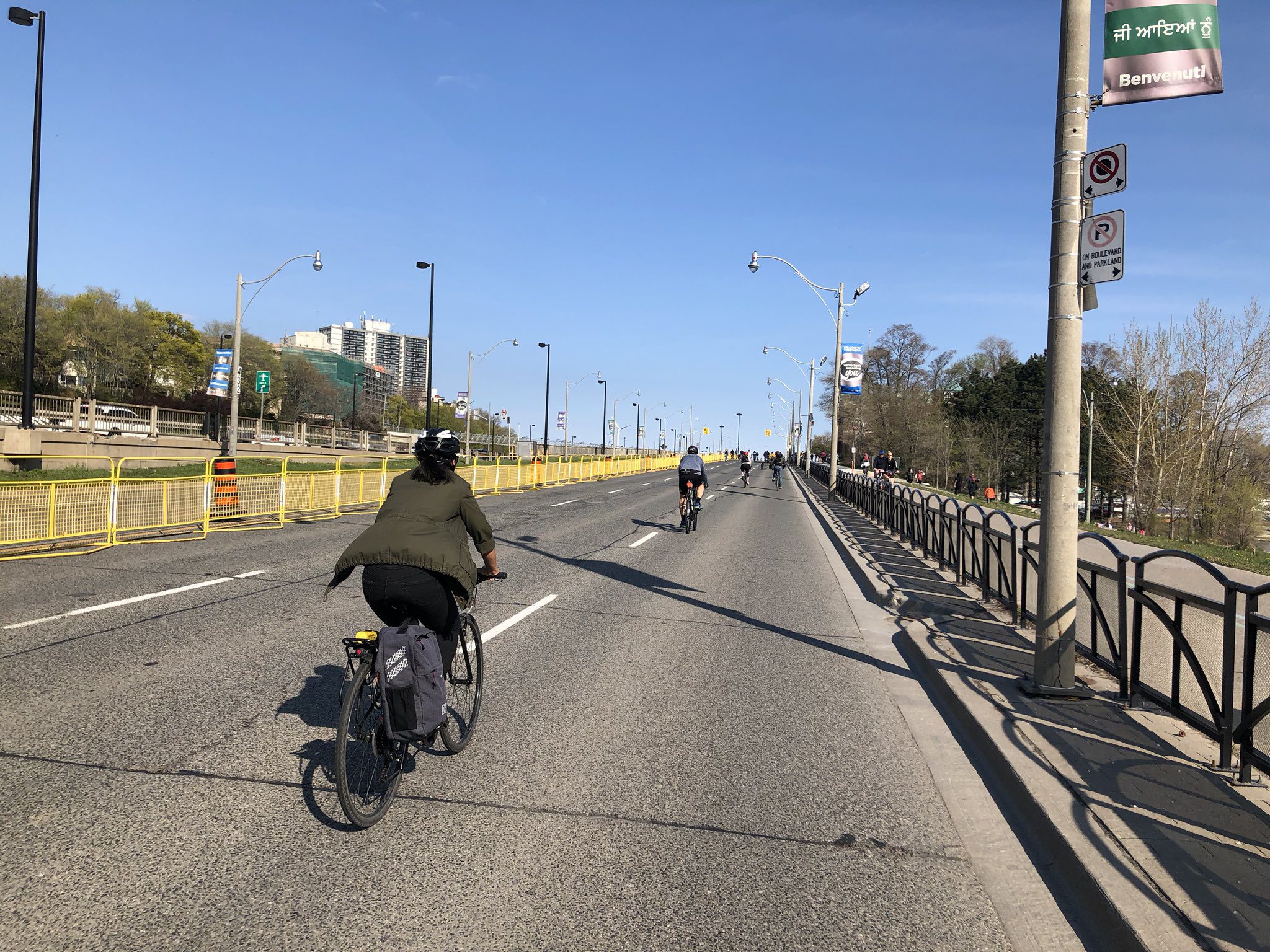Toronto cyclists are taking advantage of the ActiveTO initiative
Street closures have finally come to T.O.

Toronto was one of the last cities to acknowledge the need for more pedestrian and cyclist accommodation during the pandemic. The country’s most populated city has struggled with bike and pedestrian safety in the past. In 2019 it’s Vision Zero plan had to be rebooted after failing to reduce the number of traffic deaths in the city.
In late March Councillor Kristyn Wong-Tam requested the closure of a section of Yonge Street in Toronto, but the proposal was shot down. City staff suggested that residents would flock to the street, causing more harm than good.
RELATED: Canadian bike lane study confirms what cyclists already know
Since then, the city seems to have shifted it’s stance in a big way.
ActiveTO
The ActiveTO initiative takes three different approaches to improving cycling and pedestrian safety in Toronto during the pandemic. The first, ‘Quiet Streets’ involves closing local streets to allow safe physical distancing within neighbourhoods. The closed streets are selected based on factors such as population density, equity and access, access to greenspace, nearby parks, beaches and traffic volumes. More than 50 km of streets have been closed for the initial roll-out of the ‘quiet streets’ program. As of May 17, 21 streets are part of the program.
Lake Shore Blvd – 3 lanes opened up for cyclists, runners and newbie rollerbladers like me pic.twitter.com/OOodkPdRMz
— Mike Crawley (@CBCQueensPark) May 16, 2020
The second ActiveTO initiative is the closure of major roads. In late March, Calgary was one of the first Canadian cities to create a similar program, and the reception was largely positive. Toronto has acknowledged that many bike trails have become dangerously overcrowded during the weekends and, in response, has planned recurring short-term closures of major streets adjacent to these trails. On Weekends and holidays major streets will be closed to give Torontonians a space to be outside while maintaining physical distancing. May 16-18, Victoria day weekend, the eastbound lanes of Lake Shore Boulevard West, between Windermere Avenue to Stadium Road will be closed, along with Bayview Avenue from Mill Street to Rosedale Valley Road.
In order to encourage more cycling as a means of transit, the city will also be expanding and accelerating key parts of its cycling network plan. This will involve connecting more bike lanes and re-purposing curb lanes along key corridors into bike lanes.
Mixed response
Many people and cycling organizations have praised the initiative.
So much space for people on bikes, foot, strollers, and all other active transportation. More of this kind of #ActiveTO is needed across the city. #BikeTO lanes temporary and permanent too! For our city's healthy future. pic.twitter.com/5lpKrEDbwn
— Cycle Toronto (@CycleToronto) May 16, 2020
What a beautiful day to claim a street for people. Bayview is filled with families #ActiveTO #BikeTO pic.twitter.com/GJRQBhjXQU
— Becky Katz (@BeckyKatz96) May 16, 2020
The Lakeshore Boulevard Activeway is real, and it’s spectacular. #ActiveTO #BikeTO pic.twitter.com/LVTP4hNH25
— Richard Brynj ó l f s s o n (@sillygwailo) May 16, 2020
Finally!
This ought to be ongoing please
— Gigi ??♀️ (@eflorian10) May 17, 2020
But some wondered how equitable the spread of the closures is.
Thoughtful response from @whosecityisthis over on FB. Inner suburbs pinch points on bridges need relief. Plus need to address wider issues of housing insecurity. pic.twitter.com/utJx2F3ARs
— Daniel Rotsztain (@theurbangeog) May 15, 2020
@ToRoadClosures an account that has actively protested road closures in Toronto since 2016 was predictably unhappy with the road closures.
So far "ActiveTO" has been totally ineffective in reducing the number of COVID-19 cases in Toronto. Obviously it has only been two days but still… pic.twitter.com/aFWRxShyNv
— TorontoRoadClosures (@ToRoadClosures) May 16, 2020
Bicyclists closer than 2m together during closure of eastbound Lake Shore Blvd for "ActiveTO" – increases your risk of getting COVID-19. @JohnTory pic.twitter.com/bO5LphFvll
— TorontoRoadClosures (@ToRoadClosures) May 16, 2020
The newfound momentum has pushed many to propose more a permanent focus on cycling infrastructure and projects in Toronto. Velocolour says the best way to do this is to become a member of a local cycling organization such as Cycle Toronto.
